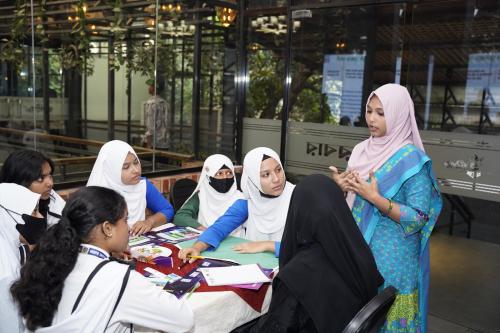2010 has all the makings of being the Year of Global Education. Important events throughout the year include the G8 chairmanship by Canada, a country that historically has been a champion of global education; the FIFA partnership with the 1GOAL campaign, which endeavors to ensure that education for children in Africa and throughout the developing world will be the lasting legacy of this summer’s World Cup in South Africa; news that South African President Zuma will invite fellow heads of state to commit to coordinated action on education on the eve of the World Cup; the UN secretary-general’s Millennium Development Goals (MDGs) Review Summit prior to the UN General Assembly in September, which will assess the reality of achieving education for all; and South Korea deciding that core development issues including education must be part of the newly-empowered G20’s top-line agenda for November.
A much less recognized event, although potentially just as important on the global education calendar, will take place this week: the board of directors of the Education for All-Fast Track Initiative (FTI) will gather in Paris on February 11th and 12th for to consider how to scale up its ambition and meet the challenge of achieving universal quality education for every child worldwide.
For the 72 million children around the world who are not in primary school, the FTI is the most important global aid mechanism to support their learning. Last year, the FTI commissioned an independent evaluation to review the initiative’s own progress at the halfway mark to the 2015 deadline for the MDGs. While this evaluation found that the overall FTI model that centers on country-owned education sector plans is a strong foundation, it asserted that greater effort must be placed on how these plans are funded, implemented and held accountable for results.
In addition to attention to expanding participation of developing countries (both government and civil society) in the global governance structure of the initiative, two specific issues should also take center stage at the meeting in Paris: strengthening the country-led process and including fragile and conflict-affected countries.
In our policy brief entitled Many Paths to Universal Primary Education: Time to Replace the Indicative Framework with a Real Country-Driven Approach, we argue that despite sincere efforts by the FTI to be driven by a country-led process, the use of a single framework that is applied to countries across all development contexts results in limiting country ownership by imposing top-down, prescriptive solutions rather than using country-specific benchmarks. To strengthen the country-led process, we suggest that the international community provides technical tools and scaled-up technical assistance to support the national education dialogue and decision-making, while also developing accountability systems that are based on country-specific metrics. This country-driven approach would allow each country to customize its education plans to fit its development context and specific educational needs.
Despite clear efforts over the past five years, the FTI has been unable to develop a consistent approach to working with fragile and conflict-affected countries. The initiative’s growing willingness to include these countries has not been enough to overcome structural obstacles that have made this effort uneven, fragmented and ultimately ineffective at delivering aid at country level. Although the FTI was never intended to be equated merely with financing, the reality is that for many developing countries, financing is a key motivation for their involvement.
Working with CfBT Education Trust (UK), our policy outlook Education’s Hardest Test: Scaling up Aid in Fragile and Conflict-Affected States focuses on the fact that donors have failed to provide sufficient resources to support the education of children and youth in these fragile and conflict-affected states. We outline seven challenges that need to be addressed and broad recommendations for a way forward for donors and the international community. Our second policy outlook, Financing for All: How to Include Fragile and Conflict-Affected States in the FTI, then outlines the specific challenges for financing education in these countries within the FTI. We provide concrete recommendations for the FTI, including adopting a single process, using more flexible financing mechanisms to meet individual country conditions, and expanding the scope of the FTI to support the whole education sector.
Newly-appointed independent chair of the FTI Board, Carol Bellamy, who formerly served as executive director of UNICEF, has encouraged the board to leverage this important opportunity by taking significant action toward revitalizing the FTI and ultimately reinvigorating the global community in support of education. The challenge ahead is large, but strong evidence shows that with adequate political will and financial support, it is possible to provide every child with a quality education. Armed with these policy recommendations among other contributions by academics and civil society, we hope that the board seizes this opportunity to make real advances toward achieving education for all.
The Brookings Institution is committed to quality, independence, and impact.
We are supported by a diverse array of funders. In line with our values and policies, each Brookings publication represents the sole views of its author(s).



Commentary
A Chance to Reinvigorate the Global Community around Education
February 11, 2010